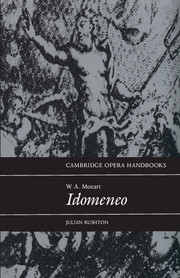Book contents
- Frontmatter
- Contents
- List of illustrations
- General preface
- Acknowledgements
- Introdution
- 1 Synopsis
- 2 Genesis of an operone
- 3 ‘Madame Dorothea Wendling is arcicontentissima’: the performers of Idomeneo
- 4 The genre of Idomeneo
- 5 From myth to libretto
- 6 Idomeneo after Mozart
- 7 General structure of Idomeneo
- 8 Two soliloquies
- 9 The musical language of Idomeneo
- 10 Tonality and motive
- 11 Elettra's first aria and the storm scene
- 12 Conclusions
- Notes
- Select bibliography
- Index
- Plate section
- Frontmatter
- Contents
- List of illustrations
- General preface
- Acknowledgements
- Introdution
- 1 Synopsis
- 2 Genesis of an operone
- 3 ‘Madame Dorothea Wendling is arcicontentissima’: the performers of Idomeneo
- 4 The genre of Idomeneo
- 5 From myth to libretto
- 6 Idomeneo after Mozart
- 7 General structure of Idomeneo
- 8 Two soliloquies
- 9 The musical language of Idomeneo
- 10 Tonality and motive
- 11 Elettra's first aria and the storm scene
- 12 Conclusions
- Notes
- Select bibliography
- Index
- Plate section
Summary
Having considered Idomeneo historically and in terms of genre, and then of its standing throughout its two centuries of existence, and having tapped some of its potential for deep critical analysis, we are still a long way from exhausting what this opera has to offer. I shall conclude by attempting to tie up a few musical, dramatic, and generic loose ends, and making a few suggestions for an interpretation, which are not intended to be prescriptive (either for critical response or for staging), but which attempt to reconcile a contemporary and a modern view.
Modern interpretations of Mozart's first operatic masterpiece take their lead from Dent, whose general view was that its elevated tone restores to the theatre something essential to its spirit that modern drama including Shakespeare and most opera - tends to evade. This is to restore to Idomeneo, in a positive light, the association with neo-classical drama which Hanslick used, mildly, to denigrate it (see p. 87, above). Idomeneo concerns the relationship between human and divine government, and a willingness to suspend disbelief in the ancient gods is essential. What, in the eighteenth or twentieth centuries of the Christian era, those old gods might signify, is a larger question, but nearly every human society has been based on a system of relationship between a perceived superhuman order and the ordering of human life itself: the theme is universal.
- Type
- Chapter
- Information
- W. A. Mozart: Idomeneo , pp. 153 - 161Publisher: Cambridge University PressPrint publication year: 1993



